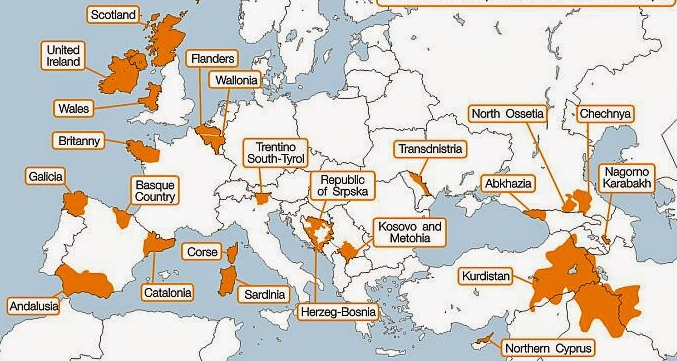Plenary Talks

PROFESSOR KATHRYN CRAMERI
The Lure of History: Historical Narratives' Ambiguous Place in Today’s Catalan Independence Movement
Mainstream Catalan nationalism – which has recently moved towards an explicitly pro-independence position – has increasingly distanced itself from using arguments based on ethnicity to validate its claims to Catalonia’s distinctiveness. This has entailed a corresponding shift away from perennial/primordial rhetoric towards arguments based on the needs and desires of Catalonia’s current population. However, historical events such as the Catalan resistance to Bourbon rule that resulted in defeat in 1714 and the abolition of Catalonia’s governing institutions still surface regularly in pro-independence discourse. As Steven J. Mock has said (in Symbols of Defeat, 2012), nationalists tend in fact to be profoundly ambivalent about their ethnic past, since it is both useful and problematic for the project of building identification with the nation. This paper explores this ambivalence through the prism of the historical narratives that have accompanied the rise in support for independence in the twenty-first century. The main focus will be on historical novels written during this period that are set in key moments of Catalonia’s history – such as the defeat of 1714 –, and that articulate new messages about the past designed to appeal to the Catalans of the present, wherever their ethnic origins might lie.
PROFESSOR ADRIAN GUELKE
Changing International Norms and Political Accommodation in Deeply Divided Societies
Changes in international norms scarcely less radical than those that occurred after the end of the Second World War followed the end of the Cold War and the collapse of communist rule in Eastern Europe. The changes have had profound implications for the quest for political accommodation in deeply divided societies. Most notable have been the shift in attitudes towards secession reflected in the creation of new states, the new interventionism, and the transformation in views on dealing with the past in post-conflict societies. The changes have had obvious relevance to the politics of deeply divided societies, but they have also had a bearing on the politics of practically all multi-ethnic or pluri-national societies, given the importance of identity politics in the dispensations of the post-Cold War political order. What remains open to argument is whether these changes have advanced or retarded the prospects for peace and stability of divided societies in the long run, as will be illustrated through discussion of the case of Northern Ireland.
DR DIEGO MURO
The End of ETA
Is the counter-terrorist effort the most significant variable behind a process of terrorist disengagement? Do groups that abandon violence come to the realization that terrorism has failed or do they perceive new opportunities for achieving their political goals through peaceful means? This presentation will examine the decline of the terrorist group Euskadi Ta Askatasuna (ETA) in order to identify the mechanisms that facilitate abandonment, defection and decline. The lecture will examine the macro and meso processes that account for terrorist effectiveness. First, there will be a brief overview of the counter-terrorist effort that led to the ‘definitive cessation’ of ETA’s activities in 2011. Second, there will be an analysis of the structural reasons behind the weakening of radical Basque nationalism, at both organizational and electoral levels. Third, the presentation will examine the impact of political violence on both moderate and radical Basque nationalism as well as the recent electoral gains of secessionist parties. Fourth, there will be an examination of the challenges ahead for conflict resolution, from prisoners and decommissioning to victimhood and reconciliation. Finally, I will conclude by examining the relationship between the decline of radical Basque nationalism and the ‘pulling together’ effect.
PROFESSOR ROBERT A. SAUNDERS
Separatism in the New Millennium: Looking Back, Looking Forward
The last 50 years have witnessed a steady rise in the importance of separatism as a political force across the European continent, specifically separatism motivated by ethnic nationalism. In his keynote address, Dr Robert A. Saunders will provide a historical account of major separatist movements since 1960s. This is done in an effort to contextualize the ongoing moves towards secession within and adjacent to the European Union, especially in Catalunya, Scotland, Flanders, and ‘New Russia’. His talk will address the strengths and weaknesses of minority nationalism as a political platform in the contemporary era of international relations, highlighting the differences between ‘direct action’ used by groups such as ETA and PIRA and the activities of legal political movements in places like Belgium and Scotland. Dr Saunders will also address the role of minority nationalism in bringing about the dissolution of the federative socialist republics of the Soviet Union, Yugoslavia, and Czechoslovakia within framework of his concept of the ‘third wave’ of twentieth-century decolonization, as well as the importance of ‘great power’ geopolitics in the ethnically-fuelled civil wars in Cyprus, the Balkans, the South Caucasus, and most recently Ukraine. In his closing remarks, he will bring the focus back to Spain, assessing the various flows of globalization associated with the new millennium and how these influence attitudes towards independence in the country.